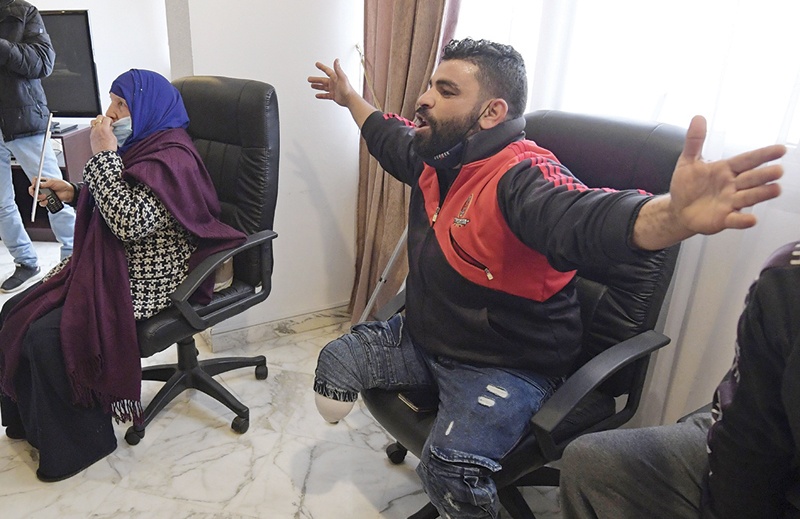 TUNIS: In this Jan 6, 2021 photo, a former Tunisian protester who was injured during the revolution demands recognition and compensation. - AFP
TUNIS: In this Jan 6, 2021 photo, a former Tunisian protester who was injured during the revolution demands recognition and compensation. - AFPTUNIS: Tunisia, where the Arab Spring started, has also been its relative success story - but celebrations will be muted when it marks tomorrow one decade since protesters ousted its autocratic leader. The revolutionary optimism of the pro-democracy movement that deposed president Zine el Abidine Ben Ali in 2011 has given way to hopelessness among the one third of young people without a job.
And while Tunisia - unlike most of its regional neighbors - has kept the candle of a fragile democracy burning, widespread popular discontent is now driving many to leave. Tunisians made up the largest number of irregular migrants, more than 12,000, who arrived in Italy last year on boats crossing the Mediterranean.
The North African country's key tourism sector, already hit hard by a string of jihadist attacks in 2015, has all but collapsed amid the COVID-19 pandemic, leaving the resorts that line its coastline mostly deserted. It was in Tunisia where the revolts started after young street vendor Mohamed Bouazizi, cheated and humiliated by local officials, set himself on fire on Dec 17, 2010.
His desperate protest triggered a wave of popular revolts across North Africa and the Middle East, briefly raising hopes of bringing political freedom to millions. While those hopes were broadly dashed, and Syria, Libya and Yemen were plunged into brutal wars, small Tunisia steered a more hopeful path following Ben Ali's flight to Saudi Arabia on Jan 14, 2011.
The country has since had nine governments in 10 years, but the transfers of power have been peaceful, despite initial turmoil and the deadly Islamist attacks. The Nobel Peace Prize was in 2015 awarded to Tunisia's so-called Quartet of human rights, legal, labor and business groups "for its decisive contribution to the building of a pluralistic democracy ... in the wake of the Jasmine Revolution of 2011".
A new constitution agreed in 2014 by Islamists and the opposition was hailed as a historic breakthrough. The country has since held several elections deemed fair by local and foreign observers, most recently bringing to power President Kais Saied, a jurist, in late 2019. Former bloggers have launched independent media outlets and a revived Tunisian cinema now dares to tackle once taboo subjects, while a dynamic civil society has emerged.
But discontent has been fuelled by the continued economic malaise, widely blamed on a political class paralyzed by infighting. Critics accuse powerful families of maintaining a crony capitalist system where rules and credit lines shield them from open competition. The economy contracted by nine percent in 2020, the World Bank estimates, and people have taken to the streets once more in marginalized regions to demand jobs and investment.
"We have not moved from a democratic transition to an economic transition," journalist Zied Krichen told AFP. The public sector has raised salaries and bloated its payroll, with the number of civil servants rising by 50 percent from 2010 to 2017. But this has failed to meet "the enormous expectations", said Krichen. "The various governments have tried to buy social peace without having a long-term policy of economic development or social integration."
The crisis has fuelled nostalgia in some quarters for the stability of the years under Ben Ali. Some former protesters meanwhile look back with bitterness on the years since they rallied for "freedom, work (and) national dignity", often at great personal cost. A preliminary count by Tunisian authorities in 2012 found that 338 people were killed and 2,147 wounded during the popular uprising.
Those figures shrank to 129 killed and 634 injured in an online list published in Oct 2019 by the Tunisian Higher Committee on Human Rights and Fundamental Freedoms. While many victims and families are still waiting for recognition and compensation, few of those responsible have been held to account. Some now hold senior posts in the police or army.
Day laborer Moslem Kasdallah, 31, who lost his leg in clashes with police in 2011, demanded that the state officially recognize and help victims like himself. "Some need operations, prostheses," he said, declaring he is ready to "sacrifice" himself again in the battle for justice, including the publication of an official list of victims. "We gave our blood to write history, and history must be written today by applying the law and publishing the list," he said. "We want the authorities to recognize the revolution, for the sake of history." - AFP










